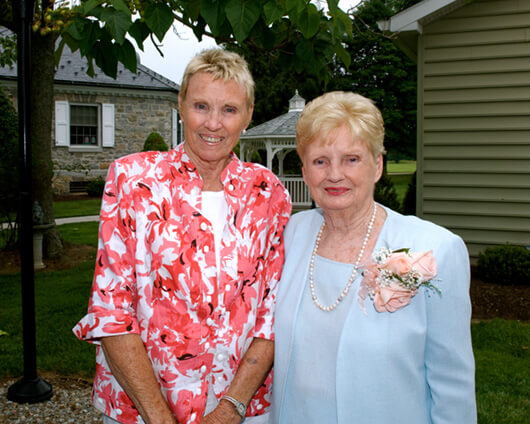We have all heard the saying, “behind every great man there’s a great woman,” and nowhere is this quote more appropriate than with regard to the Ashley Addiction Treatment history. Ashley Addiction Treatment, originally named Father Martin’s Ashley, was founded in 1983 by Fr. Joseph Martin, a Catholic priest, and Mae Ashley Abraham. Mae Ashley Abraham, and later her sister Micki Thomas, provided the special ingredients that would set Ashley Addiction Treatment apart from other rehabilitation programs, perfectly complementing the efforts of Fr. Martin.
Ashley Addiction Treatment History
Mae Ashley Abraham met Fr. Martin in 1964 after attending one of his “Blackboard Talks” at Johns Hopkins University. That night Mae was so impacted by Fr. Martin’s words of hope and encouragement that she made the decision there and then to stop drinking.
The friendship between Fr. Martin and Mae endured over the years, and eventually Fr. Martin came to reside with Mae and her husband, Tommy Abraham. Mae encouraged Fr. Martin to take his “Chalk Talk” lectures on the road, so they started their own production company and filmed about forty of Fr. Martin’s lectures to be initially disseminated to members of the U.S. Navy, and then ultimately to a broad range of venues.
One day in 1976 Mae said to him, “Father, you can talk until you die, but then what? Why don’t we build a treatment center where everything you stand for can go on, where laypeople can get the kind of treatment priests got from “Rip” (Austin Ripley) at Guest House?”
Combining their diverse backgrounds and talents resulted in the realization of their dream, to open a top rate recovery center that would be based on the principles of compassion and dignity. Mae was a driving force behind this dream coming to fruition, and was known for her quote, that “Ashley was built to be a beautiful and dignified atmosphere—free of blame, shame, and judgment.”
In time, Mae’s sister Micki Thomas, also a pioneer in the field of addiction recovery, joined the team at Ashley. Micki took on the role of program developer and supervisor, creating the world’s first inpatient relapse track. Later, with the assistance of First Lady Betty Ford, Micki would develop a children’s program, designed to provide support to the children of parents in recovery. In time, Micki would further her career by specializing in the counseling of women in recovery through The Homecoming Project.
How Women Helped Expand the Understanding of Addiction Recovery
Substance use disorder is not a one-size-fits-all problem. While the early versions of substance use treatment might have been based primarily on the male model of recovery, through the input and hard work of key women working in the addiction treatment industry, such as Mae Ashley Abraham and Micki Thomas among others, treatment is now becoming more customized. This means that the differences between the sexes, as they relate to substance use, recovery, and relapse prevention plans, help to further fine-tune rehabilitation programming.
Mae and Micki helped pave the way for addressing a broader scope of addiction treatment needs, including not only the unique needs of women in recovery, but also those of the children and family members affected by individuals in recovery. The influence of women in the field of substance use recovery provides an added dimension that captures a more holistic picture of wellness, which ultimately increases recovery success.
Ashley Addiction Treatment, through the trail-blazing efforts of a compassionate priest, a Presbyterian minister, and two female pioneers in the field, has succeeded in treating over 45,000 people since its inception in 1983. Through the combined efforts of both male and female skill sets and points of views, a recovery program that melds science, medicine, heart and soul has risen to the top of its field.
Ashley Addiction Treatment believes that connection is vital to a successful recovery, with treatment options focused on holistic, integrated, and compassionate care. Ashley utilizes a variety of treatment modalities to support the healing process. If you would like to speak to someone about our care options, please reach out to us today at 800-799-4673.




